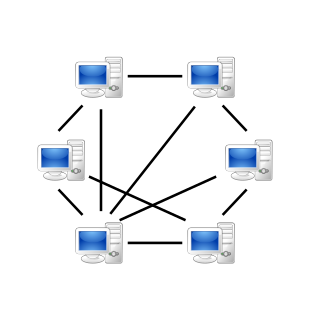The Domain Name System (DNS) is a hierarchical and decentralized naming system for computers, services, or other resources connected to the Internet or a private network. It associates various information with domain names assigned to each of the participating entities. Most prominently, it translates more readily memorized domain names to the numerical IP addresses needed for locating and identifying computer services and devices with the underlying network protocols. By providing a worldwide, distributed directory service, the Domain Name System has been an essential component of the functionality of the Internet since 1985.

Freenet is a peer-to-peer platform for censorship-resistant communication. It uses a decentralized distributed data store to keep and deliver information, and has a suite of free software for publishing and communicating on the Web without fear of censorship. Both Freenet and some of its associated tools were originally designed by Ian Clarke, who defined Freenet's goal as providing freedom of speech on the Internet with strong anonymity protection.

Peer-to-peer (P2P) computing or networking is a distributed application architecture that partitions tasks or workloads between peers. Peers are equally privileged, equipotent participants in the application. They are said to form a peer-to-peer network of nodes.

A distributed hash table (DHT) is a distributed system that provides a lookup service similar to a hash table: key-value pairs are stored in a DHT, and any participating node can efficiently retrieve the value associated with a given key. The main advantage of a DHT is that nodes can be added or removed with minimum work around re-distributing keys. Keys are unique identifiers which map to particular values, which in turn can be anything from addresses, to documents, to arbitrary data. Responsibility for maintaining the mapping from keys to values is distributed among the nodes, in such a way that a change in the set of participants causes a minimal amount of disruption. This allows a DHT to scale to extremely large numbers of nodes and to handle continual node arrivals, departures, and failures.

GNUnet is a software framework for decentralized, peer-to-peer networking and an official GNU package. The framework offers link encryption, peer discovery, resource allocation, communication over many transports and various basic peer-to-peer algorithms for routing, multicast and network size estimation.

A content delivery network, or content distribution network (CDN), is a geographically distributed network of proxy servers and their data centers. The goal is to provide high availability and performance by distributing the service spatially relative to end users. CDNs came into existence in the late 1990s as a means for alleviating the performance bottlenecks of the Internet, even as the Internet was starting to become a mission-critical medium for people and enterprises. Since then, CDNs have grown to serve a large portion of the Internet content today, including web objects, downloadable objects, applications, live streaming media, on-demand streaming media, and social media sites.
An overlay network is a computer network that is layered on top of another network.

Magnet is a URI scheme that defines the format of magnet links, a de facto standard for identifying files (URN) by their content, via cryptographic hash value rather than by their location.
In computer networking, the multicast DNS (mDNS) protocol resolves hostnames to IP addresses within small networks that do not include a local name server. It is a zero-configuration service, using essentially the same programming interfaces, packet formats and operating semantics as the unicast Domain Name System (DNS). Although Stuart Cheshire designed mDNS as a stand-alone protocol, it can work in concert with standard DNS servers.
Gluster Inc. was a software company that provided an open source platform for scale-out public and private cloud storage. The company was privately funded and headquartered in Sunnyvale, California, with an engineering center in Bangalore, India. Gluster was funded by Nexus Venture Partners and Index Ventures. Gluster was acquired by Red Hat on October 7, 2011.
Sinhala language software for computers have been present since the late 1980s but no standard character representation system was put in place which resulted in proprietary character representation systems and fonts. In the wake of this CINTEC introduced Sinhala within the UNICODE standard. ICTA concluded the work started by CINTEC for approving and standardizing Sinhala Unicode in Sri Lanka.

The Informatics Institute of Technology (IIT) is a private higher education institute in Sri Lanka which offers specialized offshore British degree programmes in IT and Business. IIT has collaborated with leading British universities to offer undergraduate and postgraduate degree programmes in Sri Lanka since its inception in 1990.
A reliable multicast is any computer networking protocol that provides a reliable sequence of packets to multiple recipients simultaneously, making it suitable for applications such as multi-receiver file transfer.

Live distributed object refers to a running instance of a distributed multi-party protocol, viewed from the object-oriented perspective, as an entity that has a distinct identity, may encapsulate internal state and threads of execution, and that exhibits a well-defined externally visible behavior.

The Information and Communication Technology Agency (ICTA) is the lead agency in Sri Lanka for implementation of information and communications technology (ICT) initiatives by the Government of Sri Lanka. It was established to develop the economy of Sri Lanka through ICT. To this end, it works to improve both the technological capacity of the country, such as building infrastructure, and the readiness of its people, through education and human resources. It is also active in developing regulations around the use of technology and disseminating information worldwide about Sri Lankan ICT. Its current Chairman is Jayantha de Silva.

Distributed data flow refers to a set of events in a distributed application or protocol.

Polipo is a lightweight caching and forwarding web proxy server. It has a wide variety of uses, from aiding security by filtering traffic; to caching web, DNS and other computer network lookups for a group of people sharing network resources; to speeding up a web server by caching repeated requests. It can be configured to use on-disk cache and serve cached content when offline and perform various forms of content filtering.

Ada Derana is the brand for newscasts on the TV Derana television network in Sri Lanka. Its content is available in Sinhala, Tamil and English.
In contrast to IP-based, host-oriented, Internet architecture, content centric networking (CCN) emphasizes content by making it directly addressable and routable. Endpoints communicate based on named data instead of IP addresses. CCN is characterized by the basic exchange of content request messages and content return messages. It is considered an information-centric networking (ICN) architecture.










